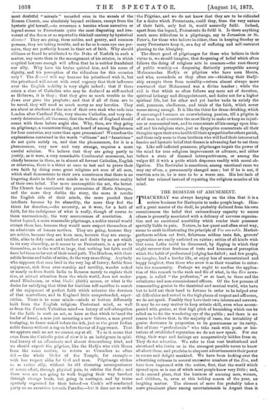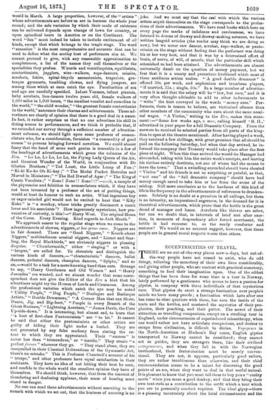THEBUSINESS OF AMUSEMENT.
THACKERA.Y was always harping on the idea that it is a serious business for Harlequin to make people laugh. Him- self a great master of the droll, he probably deduced from his own consciousness the belief that extraordinary capacity to amuse others is generally associated with a delicacy of nervous organisa- tion and an emotional sensibility which render their possessor specially liable to pain, Nature, in her queer and often cruel way, seems to exult in illustrating the principle of Vos non vobis. Market- gardeners seldom eat fruit, fishermen seldom taste fish, grocers' apprentices are easily surfeited on raisins ; critics of all kinds wish that some Lethe could be discovered, by dipping in which they might recover that freshness of taste and keenness of perception which the habit of professional judging has dulled ; and few people, we imagine, lead a harder life, or enjoy less of unconstrained and happy laughter, than those who avow it as their vocation to enter- tain the community. Perhaps we ought to confine the applica- tion of this remark to the rank and file of what, in the Era news- paper, is called "the profession," or at least, to these and the subalterns and non-commissioned officers. Of the few persons of commanding genius in the theatrical and musical world, who have but to hold out their hand to fortune in order to be helped over all difficulties and seated in the high places of respect and affluence, we do not speak. Possibly they have their own labours and sorrows. It may be no easy matter to keep artistic skill, even when accom- panied with genius, at that high pitch of burnishing which can be relied on to fix the wandering eye of the public ; and there is no reason to believe that, in the majority of cases, the irritability of genius decreases in proportion to its genuineness or its rarity. But of those " professionals " who take rank with poets or his- torians of established reputation we do not now speak. For one thing, their ways and feelings are comparatively hidden from us. They do not advertise. We refer to that vast brotherhood and sisterhood who invite us in the strongest possible terms to know all about them, and proclaim in eloquent advertisements their power to amuse and delight mankind. We have been looking over the advertising columns in several successive numbers of the Era, and have been impressed with the notion, first, that the world which opened upon us is one of which most people know very little ; and, in ths second place, that the business of amusing men, women, and children, is, even at this holiday season of the year, no laughing matter. The element of mere fun probably takes a more prominent place among entertainments in August than it
would in March. A large proportion, however, of the " artists " whose advertisements are before us are in harness the whole year round; and the sole variation by which their mode of existence can be enlivened depends upon change of town for country, or upon episodical tours in America or on the Continent. The word "fun" must indeed be taken to include excitement of all kinds, except that which belongs to the tragic stage. The word
"us " is the most comprehensive and accurate that can be used to define what the motley host of performers aim at. We cannot pretend to give, with any reasonable approximation to completeness, a list of the names they call themselves or the specialities they profess. Wizards and ventriloquists, equilibrists, contortionists, jugglers, wire -walkers, rope-dancers, mimics, acrobats, fakirs, spiral-bicycle ascensionists, trapezists, gro- tesque gymnasts, tumbling clowns, and flying jumpers, are among those which at once catch the eye. Peculiarities of sex and age are carefully specified. Infant Venuses, infant pianists, baby acrobats, lion-tamers twelve years old, female walkers of 1,000 miles in 1,000 hours, "the smallest vocalist and comedian in the world," "the child wonder," "the greatest female contortionist in the world," announce their charms and achievements. These ad- vertisers are clearly of opinion that there is a good deal in a name. In fact, it rather surprises us that no one advertises his skill in fitting names to performances, and we think it probable that, if we extended our survey through a sufficient number of advertise- ment columns, we should light upon some professor of nomen- clature who, for a consideration, furnishes "a commodity of good names" to persons bringing forward novelties. We could almost fancy that the hand of some such genius is traceable in a few of the headings of advertisements which grace the columns of the Era. "Lo Lo, L Lo, Lo Lo, the Flying Lady Queen of the Air, and Greatest Wonder of the World, in conjunction with Be Glorion Brothers ;" "Ted Lauri, the Little Lump of Fun ;"
Ki-ki Ko-ko Oh Ki-key ;" "The Model Pocket Hercules and Marvel in Miniature ;" "The Red Dwarf of Agar ;" "The King of Comic Vocalists ;" " Zeno ! Zeno ! ! Zeno! ! !"—voia, a sample of the piquancies and felicities in nomenclature which, if they have not been invented by a professor of the art of putting things, would at least do honour to such an artist. What ingenious boy or eager-minded girl would not be excited to hear that " Kiky Koko" is "a monkey, whose tricks greatly disconcert a comic lover and his associates "? How ingeniously mysterious, how pro- vocative of curiosity, is this!—" Harry West. The original Home -of the Carsa. Every Evening. Kind regards to Jack Heath."
We approach nearer to the regular stage when we come to the advertisements of clowns, niggers, et hoc genus mime. Niggers are in fair demand. There are "Good Niggers," "Knock-about Niggers," multitudinous musical niggers, and "Linnet- and Star- ling, the Royal Blackbirds," are obviously niggers in pleasing -disguise. " Chambermaids," either " singing " or with a 4' brogue," are called for. To chronicle and distinguish the various kinds of dancers,— " characteristic " dancers, ballet dancers, pedestal dancers, champion dancers, "Sylphs," and so
• on,—would be a task for a more knowing hand than ours. Strange to say, "Heavy Gentlemen and Old Women" and "Heavy Juveniles" are wanted, and we almost wonder that some corre- spondent does not give the Editor of the Era a hint that his advertisers might try the Houses of Lords and Commons. Among the professional varieties which catch the eye may be noted "Utility People," "Dog People," "Duologue and Burlesque Artists," "Double Drummers," "A Corner Man that can Skate, Dance, Jig, and Big-boot," "People in every Branch of the Ghost Business," "Lightning Acrobats," "James Davis, the Cure Up-side-down." It is interesting, but almost sad, to learn that "a host of first-class Pantomimists " are "to let." It cannot be said that either the pantomimists or other artists are guilty of hiding their light under a bushel. They are not prevented by any false modesty from stating the ex- tent to which they are appreciated. Their "success" is never less than "tremendous," or "terrific." They create "a perfect furore" wherever they go. "They stand alone, they are unequalled in their Classical Delineations of the Gymnastic Art, there's no mistake." This is Professor Chantrell's account of his "troupe," and other professors have equal satisfaction in their -assistants. They have no idea of not letting their best be seen, and confide to the whole world the excellent opinion they have of themselves. We should think, however, that from the amount of thundering and deafening applause, their sense of hearing must stand in danger.
No one can read these advertisements without assenting to the remark with which we set out, that the business of amusing is no
joke. And we must say that the zeal with which the various artists acquit themselves on the stage corresponds to the profes-
sions of their advertisements. We have read books which bore on every page the marks of indolence and carelessness, we have listened to dozens of drowsy and drowsy-making sermons, we have written languid articles (the reader may think we are doing so now), but we never saw dancer, acrobat, rope-walker, or panto- mimist on the stage without feeling that the performer was doing his or her very best, and that it was by a determined effort of brain, of nerve, of will, of muscle, that the particular skill which astonished us had been attained. The advertisements are almost universally dumb on the question of money payment, but we fear that it is a scanty and precarious livelihood which most of these assiduous artiste realise. "A good double drummer" is offered 30s. per week, and euphonium and trombone players, "if married, 35s.; single, 30s." In a large number of advertise- ments it is said that the salary will be "low, but sure," and it is very often thought advisable to add to other inducements to " write " the hint conveyed in the words "money sure." Per- formers, there is reason to believe, are victimised oftener than other members of the community who earn about the same nomi- nal wages. "A Victim," writing to the Era, makes this state- ment :—" Some few weeks ago, a man, calling himself 'B. H.,' advertised in your paper for a full Dramatic Company. From the answers he received he selected parties from all parts of the king- dom to open at the theatre mentioned. After having played a week, they received a few shillings, with great promises that all should be paid on the following Saturday, but when that day arrived, he in- formed the company that Treasury would take place after the first piece at night. When this time arrived the would-be Manager had absconded, taking with him the entire week's receipts, and leaving his victims entirely destitute, not one of whom had the means to leave the town." That a swindling scoundrel should have cheated " Victim " and his friends is not so surprising or painful, as that, "not one" of the "full dramatic company" should have had money enough saved to take him or her from the scene of the mishap. Still more conclusive as to the hardness of this kind of life is the frequency in the advertisements of references to drunken- ness. Sobriety is no doubt at a premium in all callings, but there is an intensity, an impassioned eagerness, in the demand for it in theatrical advertisements, which prove that the bottle is the great dread of manager and lessee. Acrobats like thieves are sober, but can we doubt that, in intervals of brief rest after exer- tion, in moments of despondency after forced merriment, the bottle is had recourse to, as the ready comforter and restorer? We would on no account suggest, however, that these people are in general moral respects worse than others.































 Previous page
Previous page